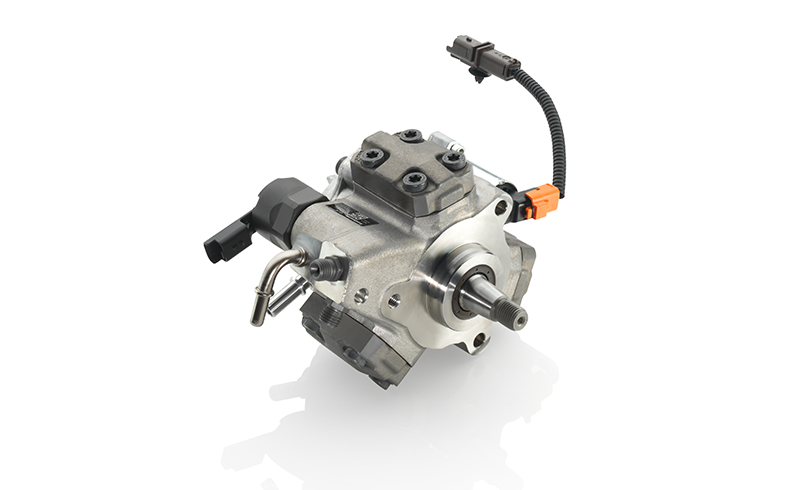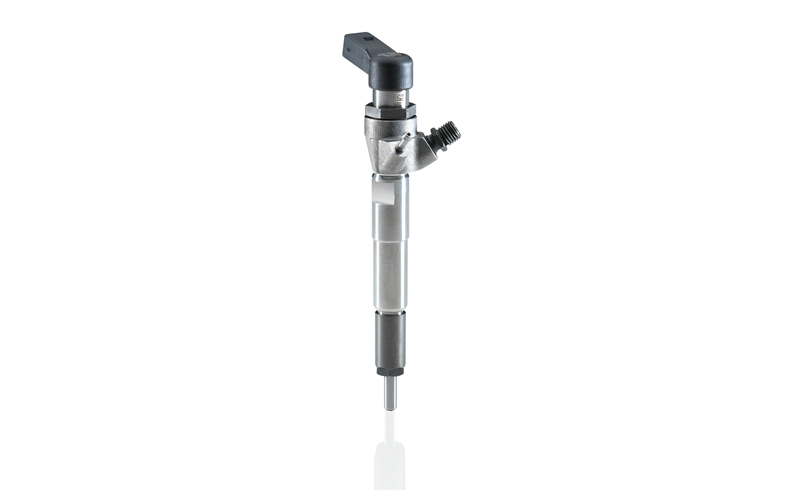Diesel injection system
Modern diesel engines must meet strict requirements. Drivers expect high power and torque values, low fuel consumption and quiet engine running. Furthermore, diesel engines must meet the strict...
Function

Modern diesel engines must meet strict requirements. Drivers expect high power and torque values, low fuel consumption and quiet engine running. Furthermore, diesel engines must meet the strict emission values of current and future exhaust gas standards. A good mixture preparation is a prerequisite for full and efficient fuel combustion in a diesel engine. To achieve this, the fuel must be injected in the right quantity, at the right time and at the highest possible pressure. This is the task of the diesel injection system. Over time, the common rail system (CRS) has established itself as the best technological solution.
CRS2 with 1,600 to 2,000 bar and solenoid valve injectors
Rising fuel prices and increasingly strict exhaust gas limit values are making modern, economic and environmentally-friendly diesel engines the drive solution of choice. CRS2 series common rail systems are a cost-effective and performance-optimised solution for further reducing fuel consumption and thus vehicle running costs.
Each system comprises
- a high-pressure pump
- the high-pressure rail
- an injector for each cylinder and
- the electronic control unit.
Electronic diesel control (EDC) regulates not only the overall injection process but also the charging pressure and exhaust gas recirculation.

At the heart of these systems are their rapid-switching solenoid valve injectors which make for short injection distances. The powerful second-generation solenoid valve injectors offer engine design engineers high levels of freedom when setting up the injection process. Up to eight separate injections per operating cycle are covered in a narrow time window. Multiple fuel injection helps to further reduce fuel consumption and CO2 emissions as well as harmful substance and noise emissions from the engine.
The solenoid valve injectors for the CRS2 are available in various designs. The optimised ferromagnetic core of the CRI2-16 injector, for example, achieves high forces when the solenoid valve opens. The second armature module increases dynamic performance during actuation of the nozzle needle and minimises intervals between injections. The injector in the CRS2-18 system has a pressure-compensated solenoid valve. This enables the system pressure to be increased still further. The CRI2-20 with pressure-compensated solenoid valve has an integrated additional rail volume which reduces pressure oscillations. A reduction in return flow volume increases hydraulic efficiency.
The CRS2 series is suitable for diesel engines with up to eight cylinders and a wide power and torque spectrum. The modular systems can be adapted to a wide variety of engine types. The increased pressure of these systems and technical modifications enable current and future emissions targets to be met. Moreover, higher injection pressures are giving engine manufacturers more freedom where the design of the basic engine and exhaust re-treatment are concerned. The CRS2 is available in variants for light commercial vehicles and customised for off-road vehicles (agricultural and construction machinery).
CRS3 with 1,800 to 2,000 bar and piezo injectors
Fuel consumption is an important factor for the cost-effectiveness and thus the market success of a vehicle, in particular where high mileages are concerned. Other important factors are emissions, running noise and the power output of the engine. The piezo injectors of modern CRS3-18 and CRS3-20 common rail systems with 1,800 bar and 2,000 bar system pressure respectively are enabling the design and construction of engines with ideal property profiles.
Each system comprises a high-pressure pump, the high-pressure rail, an injector for each cylinder and the electronic control unit. With their increased switching speed, pre-injection quantities are very low with CRS3-18/-20 piezo injectors. The reduction in hydraulic power loss results in a lower fuel temperature, rendering additional fuel cooling unnecessary. CRS3-18 and CRS3-2 common rail systems are used in top performance passenger cars and light commercial vehicles.
Variations in fuel quality are a challenge for every injection system. With their robust piezo actuator, CRS3-18/-20 injectors are fully equipped to rise to this challenge. A piezo actuator is capable of approximately ten times the power of a solenoid valve and is thus less sensitive to small impurities in fuel. With minimum pre-injection quantity, rapid injection processes and volume stability over time, CRI3-18 and -20 piezo injectors lead the field for multiple fuel injection.
As the piezo actuator is integrated in the housing, the piezo injectors are slim and take up much less installation space than injectors with a solenoid valve. The piezo injector supports multiple fuel injection at minimum intervals. As the actuator triggers the nozzle needle directly (no hydraulic control circuit), response times are short. Optimised injector characteristics mean that quantities can be corrected throughout the service life. Teach-in functions stored as software in the electronic control unit are used for this purpose.
Environmental protection
The common rail system enables combustion sequences to be optimised. This significantly reduces fuel consumption. At the same time, emissions and combustion noise also drop. The slimmer design of modern diesel injection systems reduces vehicle weight and also fuel consumption. Furthermore, precision sequence control increases efficiency and reduces power loss. The start/stop functionality of diesel injection systems also increases efficiency and reduces fuel consumption.






